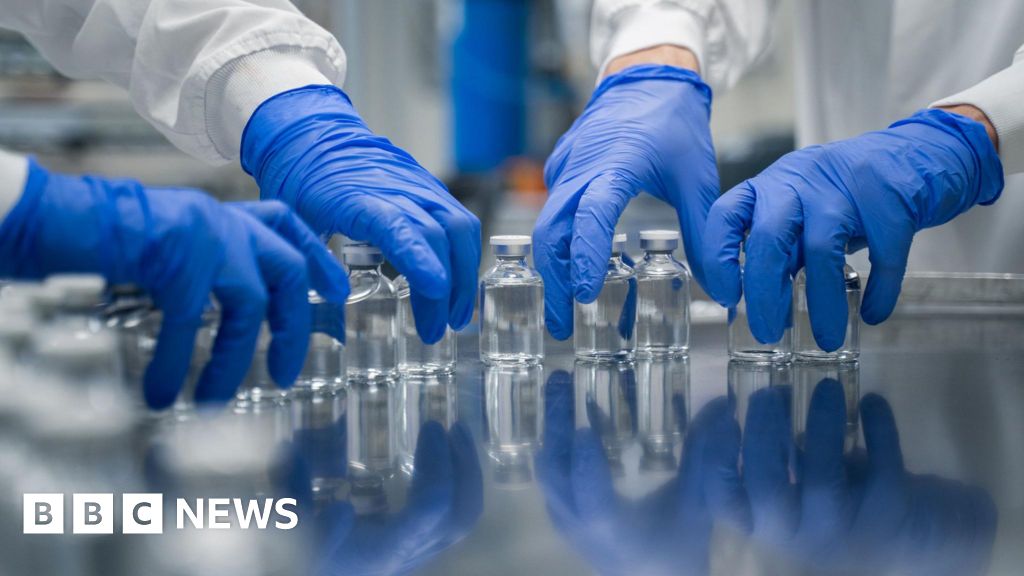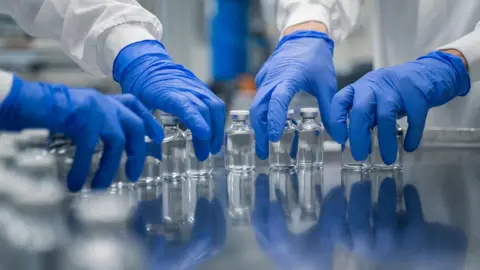Business
Merck scraps £1bn expansion in the UK over lack of state investment

Faarea Masud, Rachel Clun and Simon JackBusiness reporters
 Getty Images
Getty ImagesUS pharmaceutical giant Merck is scrapping the planned £1bn expansion of its UK operations, saying the government is not investing enough in the sector.
The multi-national business, known as MSD in Europe, said it would move its life sciences research to the US and cut more than 100 UK jobs, blaming successive governments for undervaluing innovative medicines.
A spokesperson for the government defended its investments in science and research, but acknowledged there was “more work to do”.
Pharmaceutical companies have been refocusing on American investments following pressure from US President Donald Trump, including threats of sky-high tariffs on drug imports.
MSD had already begun construction on its site in London’s King’s Cross which was due to be completed by 2027, but said it no longer planned to occupy it.
The company will also vacate its laboratories in the London Bioscience Innovation Centre and the Francis Crick Institute by the end of the year, which will lead to 125 job losses.
A spokesperson for the drug company said the decision “reflects the challenges of the UK not making meaningful progress towards addressing the lack of investment in the life science industry and the overall undervaluation of innovative medicines and vaccines by successive UK governments”.
Richard Torbett, chief executive of the Association of the British Pharmaceutical Industry, said the decision was “an incredible blow”.
“We’ve really got to see it as a wake up call to try and understand what is driving companies to make these difficult decisions and what can we do to turn that round,” he told the BBC’s Wake Up To Money programme.
“The lack of competitiveness of the UK is the big thing that’s driven the decision,” he added.
“We’ve got great strengths in this country – we’ve got fantastic academic institutions, good infrastructure, amazing medical research charities – but we’ve got systematic under-investment in the products that come out of the end of innovation.”
MSD is the latest pharmaceutical company to abandon or reduce investment plans in the UK.
In January, AstraZeneca walked away from plans to invest £450m in expanding a vaccine manufacturing plant in Merseyside earlier this year, blaming reduced government support.
The UK boss of another pharmaceutical giant warned last month that NHS patients would lose access to cutting-edged treatments because Britain was “largely uninvestable”.
Norvartis’s Johan Kahlstrom said the company had “already been unable to launch several medicines” in the country due to the “declining competitiveness” of the UK market.
Industry sources told the BBC the industry had been attracting major funding in the hub around Kings Cross focused on the intersection between life sciences and AI.
They pushed back on claims that the decision was linked to ongoing negotiations over drug prices, in which industry has been lobbying hard for the NHS to approve more and pay more for medicines.
The current pricing regime was set and agreed to by drug companies in 2023 – less than 18 months ago.
Since then, drug companies have come under pressure from the Trump administration to lower drug prices for US customers and to invest more in the US – affecting their ability to invest elsewhere.
In an August interview with CNBC, Trump suggested that tariffs on pharmaceuticals imported to the US could reach up to 250%.
The threat followed an executive order signed by the president in May aimed at reducing drug prices for American consumers.
Dr David Roblin, chief executive of London-based biotechnology company Relation Therapeutics, told the BBC that the fundamentals that drove MSD to invest in the UK in the first place had not changed.
“The academic environment in the UK continues to produce innovative ideas and people to run with those ideas, which attracts foreign investment,” he said.
“The environment to do research is still outstanding: we’ve got great academics, the NHS does provide a research platform, for example the UK Biobank is proving to be a real attractor for companies like mine,” he said.
What has changed, Dr Roblin said, was the political landscape in the US which big pharma has to respond to, “because the US remains the largest market for pharmaceuticals on earth,” he added.
A spokesperson for the Department of Industry, Science and Technology said: “The UK has become the most attractive place to invest in the world, but we know there is more work to do.
“We recognise that this will be concerning news for MSD employees and the government stands ready to support those affected.”
Business
National Startup Day 2026: How India’s Startups Are Shaping The Future

Last Updated:
National Startup Day highlights India’s thriving startup ecosystem, celebrating innovation, entrepreneurship and job creation driven by founders, unicorns and Startup India mission

National Startup Day 2026 honours Indian startups, entrepreneurs and innovators driving economic growth and job creation.
National Startup Day 2026: India’s startup ecosystem has evolved into one of the world’s most vibrant and promising innovation hubs. To recognise the contribution of entrepreneurs, founders and startups transforming ideas into impactful solutions, National Startup Day is observed every year on January 16 across the country.
Launched by Prime Minister Narendra Modi in 2022, the day celebrates visionary entrepreneurs who play a crucial role in economic growth, employment generation and technological advancement.
National Startup Day serves as a reminder that innovation, backed by determination and policy support, can reshape society and create global impact.
National Startup Day 2026 Theme
The official theme for National Startup Day 2026 is yet to be announced. However, the core focus areas are expected to revolve around:
- Innovation and emerging technologies
- Entrepreneurship and leadership
- Self-reliance (Atmanirbhar Bharat)
- Startup India Mission
- Youth empowerment
- Job creation
How Startups Are Shaping India’s Future
India currently ranks as the third-largest startup ecosystem globally, with over 1.59 lakh startups recognised by the Department for Promotion of Industry and Internal Trade (DPIIT) as of early 2025. Backed by 100+ unicorns, the ecosystem continues to grow rapidly.
Metro cities such as Bengaluru, Hyderabad, Mumbai and Delhi-NCR lead this expansion, while Tier-2 and Tier-3 cities are emerging as new innovation centres, adding diversity and scale to India’s entrepreneurial journey.
Startups across fintech, edtech, health-tech, e-commerce and deep-tech are addressing real-world challenges and gaining global recognition. Technologies like artificial intelligence, blockchain and IoT are increasingly driving innovation, according to Startup India ecosystem reports.
Industry-Wise Startup Impact
DPIIT-recognised startups have generated over 16.6 lakh direct jobs across sectors as of October 31, 2024, strengthening India’s employment landscape.
- IT Services: 2.04 lakh jobs
- Healthcare & Life Sciences: 1.47 lakh jobs
- Commercial & Professional Services: 94,000 jobs
Through the Startup India initiative, the government continues to focus on skill development, funding access, ecosystem collaboration and global outreach.
Key Initiatives Under Startup India
- Capacity building and mentorship
- Outreach and awareness programmes
- Ecosystem development events
- International exposure and global linkages
- Collaboration between startups, corporates and institutions.
January 16, 2026, 07:00 IST
Read More
Business
Govt keeps petrol, diesel prices unchanged for coming fortnight – SUCH TV

The government on Thursday kept petrol and high-speed diesel (HSD) prices unchanged at Rs253.17 per litre and Rs257.08 per litre respectively, for the coming fortnight, starting from January 16.
This decision was notified in a press release issued by the Petroleum Division.
Earlier, it was expected that the prices of all petroleum products would go down by up to Rs4.50 per litre (over 1pc each) today in view of variation in the international market.
Petrol is primarily used in private transport, small vehicles, rickshaws, and two-wheelers, and directly impacts the budgets of the middle and lower-middle classes.
Meanwhile, most of the transport sector runs on HSD. Its price is considered inflationary, as it is mostly used in heavy transport vehicles, trains, and agricultural engines such as trucks, buses, tractors, tube wells, and threshers, and particularly adds to the prices of vegetables and other eatables.
The government is currently charging about Rs100 per litre on petrol and about Rs97 per litre on diesel.
Business
Gold price today: How much 22K, 24K gold cost in Delhi, Patna & other cities – Check rates – The Times of India

Gold prices climbed to a fresh lifetime high in the domestic market on Thursday amid sustained buying by jewellers and stockists, according to the All India Sarafa Association.Gold advanced by Rs 800 to hit a new peak of Rs 1,47,300 per 10 grams (inclusive of all taxes), extending gains for the fifth consecutive session. The yellow metal had closed at Rs 1,46,500 per 10 grams in the previous session.Since the start of 2026, gold prices have surged Rs 9,600, or around 7 per cent, supported by persistent demand in the physical market. In overseas trade, spot gold slipped USD 12.22, or 0.26 per cent, to USD 4,614.45 per ounce, after having touched a record high of USD 4,643.06 per ounce in the previous session.Here is how much gold costs in major Indian cities today:
Gold price in Delhi today
The price of 22K gold in Delhi is Rs 13,140 per gram, down Rs 75, while 24K gold is priced at Rs 14,333 per gram, lower by Rs 82.
Gold price in Chennai today
In Chennai, 22K gold costs Rs 13,290 per gram, up Rs 10, while 24K gold is priced at Rs 14,498 per gram, higher by Rs 10.
Gold price in Mumbai today
Mumbai markets see 22K gold priced at Rs 13,125 per gram, down Rs 75, while 24K gold stands at Rs 14,318 per gram, lower by Rs 82.
Gold price in Ahmedabad today
In Ahmedabad, 22K gold is priced at Rs 13,130 per gram, down Rs 75, while 24K gold costs Rs 14,323 per gram, lower by Rs 82.
Gold price in Kolkata today
Kolkata markets price 22K gold at Rs 13,125 per gram, down Rs 75, while 24K gold stands at Rs 14,318 per gram, lower by Rs 82.
Gold price in Jaipur today
In Jaipur, 22K gold costs Rs 13,140 per gram, down Rs 75, while 24K gold is priced at Rs 14,333 per gram, lower by Rs 82.
Gold price in Hyderabad today
Hyderabad sees 22K gold at Rs 13,125 per gram, down Rs 75, while 24K gold is priced at Rs 14,318 per gram, lower by Rs 82.
Gold price in Bhubaneswar today
Bhubaneswar markets see 22K gold priced at Rs 13,125 per gram, down Rs 75, while 24K gold costs Rs 14,318 per gram, lower by Rs 82.
Gold price in Patna today
In Patna, 22K gold costs Rs 13,130 per gram, down Rs 75, while 24K gold is priced at Rs 14,323 per gram, lower by Rs 82.
Gold price in Lucknow today
Lucknow markets see 22K gold priced at Rs 13,140 per gram, down Rs 75, while 24K gold costs Rs 14,333 per gram, lower by Rs 82.
-

 Politics1 week ago
Politics1 week agoUK says provided assistance in US-led tanker seizure
-

 Entertainment1 week ago
Entertainment1 week agoDoes new US food pyramid put too much steak on your plate?
-

 Entertainment1 week ago
Entertainment1 week agoWhy did Nick Reiner’s lawyer Alan Jackson withdraw from case?
-

 Business1 week ago
Business1 week agoTrump moves to ban home purchases by institutional investors
-

 Sports5 days ago
Sports5 days agoClock is ticking for Frank at Spurs, with dwindling evidence he deserves extra time
-

 Sports1 week ago
Sports1 week agoPGA of America CEO steps down after one year to take care of mother and mother-in-law
-

 Tech3 days ago
Tech3 days agoNew Proposed Legislation Would Let Self-Driving Cars Operate in New York State
-

 Business1 week ago
Business1 week agoBulls dominate as KSE-100 breaks past 186,000 mark – SUCH TV





